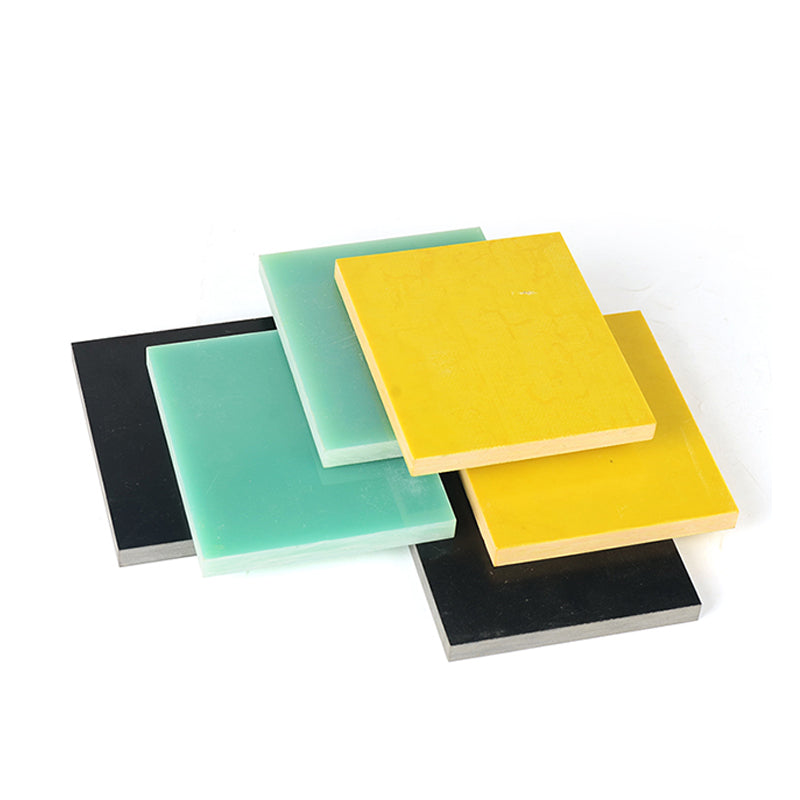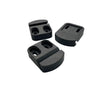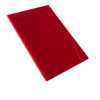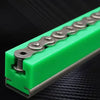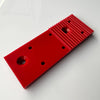Exploring the Use of PEEK Sheets in Medical and Pharmaceutical Devices
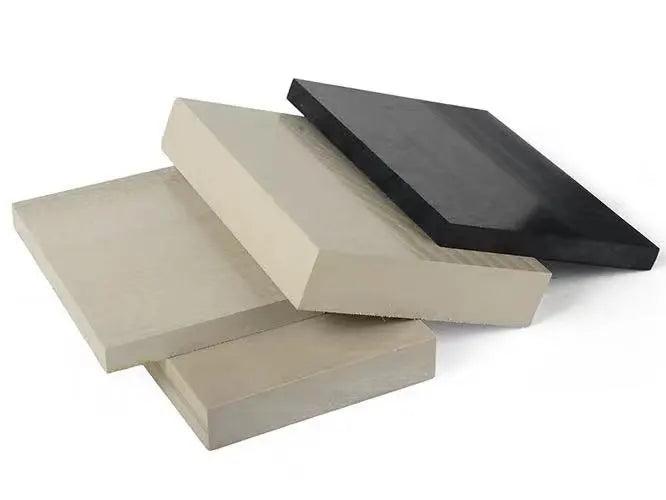
PEEK sheets are revolutionizing the medical and pharmaceutical industries with their high-temperature stability, chemical resistance, and biocompatibility. In this post, I’ll delve into the key benefits of using PEEK plastic sheets for surgical instruments, implantable devices, and pharmaceutical equipment. Learn how 1mm, 2mm, and 3mm PEEK sheets are ideal for crafting durable, reusable tools that withstand repeated sterilization. I’ll also explore the advancements in 3D-printed PEEK implants and how PEEK sheet material outperforms metals in critical applications like spinal surgery and orthopedic implants. Finally, discover why PEEK sheet stock is becoming the go-to material for precision and reliability in drug delivery systems and biopharma processing equipment.
🎉🎉🎉Limited Time Offer Use code: QR4GNY08SHVR at checkout and enjoy a special discount on your entire order! 👉 PEEK plastic

Why PEEK Sheets Are Ideal for Medical Device Manufacturing
Exceptional Biocompatibility for Medical Use
One of the most critical factors in choosing PEEK sheets for medical device manufacturing is their outstanding biocompatibility. Unlike metals, PEEK plastic sheets are biologically inert, which means they do not react adversely with human tissue. This makes them an excellent material for implantable devices, such as spinal implants and orthopedic screws. The inertness of PEEK material reduces the risk of infection and inflammation, which is vital for medical implants that remain in the body for extended periods.
In addition to its biocompatibility, PEEK offers a unique advantage over metals by being radiolucent. This property allows for better imaging during X-rays, CT scans, and MRIs without causing interference. This feature is essential in applications such as spinal surgery, where detailed imaging is required to monitor the healing process. For more information on the specific applications of PEEK plastic sheets, check out PEEK spinal surgery materials.
High-Temperature Resistance for Sterilization
PEEK sheets are known for their exceptional high-temperature resistance, making them ideal for medical device manufacturing where sterilization is a constant requirement. Devices made from PEEK sheet stock can endure temperatures up to 250°C (482°F) without losing their structural integrity. This high thermal stability is crucial in environments that demand frequent sterilization processes, such as autoclaving and steam sterilization.
For manufacturers of surgical tools and diagnostic instruments, this ability to withstand extreme heat ensures that PEEK-based devices maintain their durability and reliability over multiple sterilization cycles. This is especially important in hospitals and surgical settings, where maintaining sterile equipment is essential to prevent contamination. To learn more about this property, visit high-temperature PEEK for medical devices.
Chemical Stability for Pharmaceutical and Medical Applications
Another reason PEEK sheets are highly regarded in the medical industry is their exceptional chemical resistance. PEEK material is inert to a wide range of chemicals, including acids, alkalis, and organic solvents, making it an ideal choice for pharmaceutical environments. This resistance ensures that PEEK sheets do not degrade or react with harsh chemicals during cleaning or contact with medications. For instance, PEEK 450G sheets are commonly used in pharmaceutical processing equipment because they can withstand repeated exposure to sterilizing agents without compromising performance.
Whether it's for implantable devices or surgical instruments, PEEK provides long-lasting performance without the risk of chemical corrosion. For more details on the chemical properties of PEEK sheets, see chemical stability in PEEK medical devices.

Versatility in PEEK Sheet Grades for Specific Applications
PEEK sheets come in a variety of grades tailored for specific medical applications. Unreinforced PEEK is often used for medical implants, while glass-reinforced PEEK offers additional strength for load-bearing devices. Meanwhile, carbon-reinforced PEEK enhances both strength and stiffness, making it ideal for high-performance applications like orthopedic implants and spinal rods.
Choosing the right PEEK sheet thickness is also crucial. For intricate surgical instruments, 1mm or 2mm PEEK sheets provide the necessary flexibility and precision. In contrast, thicker sheets like 3mm PEEK sheets are used for more demanding applications, such as pharmaceutical equipment and load-bearing medical devices. You can explore more about PEEK sheet thickness at PEEK thickness guide for medical devices.
By integrating PEEK sheets into medical device manufacturing, manufacturers can benefit from the material's superior biocompatibility, high-temperature resistance, and chemical stability—all while maintaining precision and durability for the most demanding medical environments.
PEEK in Surgical Instruments: Durability and Precision
Superior Durability for Long-Term Use
One of the standout properties of PEEK sheets in surgical instrument manufacturing is their incredible durability. Surgical tools undergo repeated use in high-stress environments, and PEEK plastic sheets have the resilience to withstand the rigors of these demanding settings. Their high resistance to wear and fatigue ensures that PEEK-based instruments maintain their performance over time, even after countless sterilization cycles. This long-term durability reduces the need for frequent replacements, making PEEK sheet material an ideal choice for hospitals and clinics where cost-efficiency is a priority.
What sets PEEK sheets apart from traditional materials like stainless steel is their ability to endure without losing their mechanical properties. This endurance makes PEEK plastic highly reliable, especially in surgical tools that require exact precision and resilience. You can explore more about the benefits of PEEK durability in surgical tools at PEEK sheet material in surgery.
Sterilization Resistance for Repeated Use
Repeated sterilization is a non-negotiable requirement for surgical instruments, and PEEK sheets excel in this aspect due to their high-temperature tolerance. PEEK sheet stock can endure sterilization processes such as autoclaving and chemical disinfection without degrading. These properties make PEEK material a perfect fit for surgical environments where maintaining sterile conditions is crucial.
The ability to withstand temperatures of up to 250°C (482°F) allows PEEK plastic sheets to retain their mechanical strength and precision after sterilization, unlike traditional polymers that may weaken over time. This is particularly important in tools used in delicate surgeries where precision is essential. For more detailed information on this, visit PEEK sterilization for medical tools.
Precision in Crafting Surgical Instruments
The precision and ease of machining of PEEK sheets make them an excellent material for producing intricate and delicate surgical tools. PEEK material data sheets highlight the material’s machinability, allowing manufacturers to create fine, detailed instruments such as microsurgical tools. The flexibility of 1mm PEEK sheets is perfect for producing tools that require intricate shapes and high precision, such as scalpels or clamps.
On the other hand, 2mm PEEK sheets provide slightly more rigidity while maintaining sufficient flexibility, making them suitable for crafting instruments like forceps and needle holders. The balance of strength and flexibility in PEEK sheet thicknesses allows for the creation of tools that can perform precise maneuvers without compromising durability. To learn more about specific applications of PEEK in surgical tools, visit PEEK sheet thickness in medical devices.
Biocompatibility for Safe Surgical Applications
In addition to its mechanical strength and precision, PEEK offers biocompatibility, making it a safer alternative to metals in surgical environments. Unlike metals, PEEK plastic does not cause adverse reactions in patients, which is critical for tools that may come into contact with tissues during surgery. Furthermore, its radiolucent properties make it particularly useful in surgical instruments used in procedures where imaging is required, as it does not interfere with X-ray or MRI scans.
For healthcare professionals and manufacturers, the combination of PEEK’s biocompatibility and durability ensures safer outcomes and reduced complications in surgical procedures. Learn more about this at biocompatible PEEK materials in surgery.

PEEK Sheets for Implantable Devices: A Safer Alternative to Metals
Strength and Stiffness for Long-Term Performance
One of the main reasons PEEK sheets are becoming increasingly popular for implantable devices is their remarkable strength and stiffness. PEEK plastic sheets offer a balance between flexibility and rigidity, making them an ideal choice for spinal implants, orthopedic screws, and dental prosthetics. Unlike traditional metals, PEEK material closely mimics the stiffness of human bone, reducing the risk of stress shielding, which occurs when implants are too rigid and cause surrounding bone tissue to deteriorate.
This similarity in modulus of elasticity (a measure of stiffness) allows PEEK implants to distribute loads more evenly across bones, promoting better long-term outcomes for patients. For more details about the advantages of PEEK’s strength in implants, visit PEEK implants in spinal surgery.
Radiolucency: Improving Medical Imaging
Another significant advantage of PEEK sheets over metals is their radiolucency. PEEK material does not interfere with X-ray, CT scans, or MRI imaging, allowing doctors to monitor the healing process without obstruction. This characteristic makes PEEK spinal implants and orthopedic devices particularly useful in surgeries where post-operative imaging is critical.
For patients who require long-term implants, this radiolucency simplifies follow-up appointments and reduces the need for additional imaging techniques. Metals, on the other hand, can cause distortions in imaging results, making it more difficult to assess bone growth and alignment around the implant. You can learn more about this benefit at radiolucent PEEK in medical imaging.
Superior Biocompatibility and Safety
When considering materials for implantable devices, biocompatibility is essential. PEEK sheets offer superior biocompatibility, meaning they are less likely to provoke an immune response or rejection compared to metal implants. This makes PEEK-based devices suitable for long-term use in sensitive areas like the spine, hips, and teeth. Additionally, PEEK implants have shown lower infection rates and fewer complications related to metal sensitivity.
This inertness and resistance to degradation make PEEK material a preferred choice for devices that must remain in the body for extended periods. Learn more about biocompatible PEEK materials for implants.
Applications in Spinal, Orthopedic, and Dental Implants
PEEK sheets are widely used in spinal surgeries, particularly in the development of intervertebral cages and spinal rods. The strength and stiffness of PEEK plastic allow these devices to provide necessary support while maintaining flexibility. In orthopedics, PEEK implants are used for devices like hip replacement components and bone screws, where high strength and compatibility with human tissue are vital.
For dental applications, PEEK material is increasingly replacing metals in dental prosthetics and custom dentures. PEEK sheets are not only lightweight but also provide the necessary strength and comfort for patients, making them an excellent alternative to traditional materials. To explore specific applications, check out PEEK dental prosthetics advantages.
Durability and Resistance to Degradation
Finally, PEEK sheets offer excellent resistance to wear and tear, which is crucial for implants that must withstand constant movement and pressure. Whether in the spine, joints, or teeth, PEEK-based implants maintain their structural integrity for years without significant wear. Unlike metals, which may corrode or degrade over time, PEEK implants remain stable, reducing the need for revision surgeries and improving patient outcomes. For more insights into PEEK's durability, visit long-lasting PEEK implants for orthopedic applications.
By choosing PEEK sheets for implantable devices, manufacturers and healthcare providers can leverage a safer, more effective alternative to metals, improving patient care and long-term implant success.

PEEK in Pharmaceutical Processing Equipment
Chemical Resistance for Sterile Manufacturing
PEEK sheets are highly valued in pharmaceutical processing equipment due to their excellent chemical resistance. In environments where pharmaceutical products are developed and handled, exposure to aggressive chemicals like acids, alkalis, and organic solvents is common. PEEK material is inert to many of these substances, making it an ideal choice for equipment that must maintain its integrity while in contact with corrosive agents. This resistance helps to prevent contamination and extends the lifespan of the equipment, ensuring that it remains operational without degradation over time.
Pharmaceutical processing often involves sensitive drugs and chemicals that must remain pure. The use of PEEK sheets ensures that there is no risk of leaching or chemical interaction, safeguarding the quality of the final product. For more information on PEEK’s chemical properties, visit PEEK chemical resistance in pharmaceutical processing.
Thermal Stability for High-Temperature Environments
In addition to chemical resistance, PEEK plastic sheets are known for their superior thermal stability, which is essential in pharmaceutical environments where equipment must withstand high temperatures during sterilization. PEEK sheets can endure continuous exposure to temperatures up to 250°C (482°F) without losing their mechanical properties. This makes PEEK material highly reliable in biopharmaceutical manufacturing, where sterilization processes such as autoclaving are regularly used to eliminate contaminants.
The ability to maintain structural integrity in such extreme temperatures ensures that PEEK-based equipment can be reused multiple times, providing long-term value and reducing the cost of replacements. This is particularly advantageous in industries where contamination control is critical. Learn more about PEEK’s heat tolerance in biopharma environments.
Withstanding Sterilization Cycles Without Degradation
Sterilization is a fundamental requirement in pharmaceutical manufacturing, especially when dealing with medical drugs and biological substances. Unlike many traditional materials, PEEK sheets withstand repeated sterilization cycles, including steam, gamma radiation, and chemical disinfection, without breaking down. This resistance to sterilization processes makes PEEK an indispensable material in environments that require stringent hygiene standards, such as drug production facilities and biopharma laboratories.
Because PEEK material remains unaffected by these sterilization techniques, it ensures that pharmaceutical equipment remains free of contamination, maintaining a sterile environment for processing. For more about PEEK’s sterilization durability, visit PEEK sheets for contamination-free environments.
Applications of PEEK Sheets in Biopharmaceutical Processing
PEEK sheets are used in a variety of pharmaceutical processing equipment, from bioreactors to filtration systems. Their chemical inertness and thermal resistance allow for safe handling of both active pharmaceutical ingredients (APIs) and solvents used during the drug manufacturing process. Additionally, PEEK plastic sheets are also commonly used in seals, valves, and gaskets within pharmaceutical machinery, ensuring that no harmful substances penetrate or leak out during the process.
The non-reactive nature of PEEK makes it suitable for use in critical components of equipment that handle highly sensitive biopharmaceuticals. These parts must maintain high performance while ensuring that there are no contaminants introduced into the final product. Explore more about PEEK in biopharma equipment for detailed insights.
Versatility of PEEK Sheets in Sterile Environments
Finally, PEEK material is available in a variety of grades and thicknesses to suit the unique needs of different pharmaceutical processes. For example, 1mm PEEK sheets are perfect for intricate equipment components that require flexibility, while 3mm PEEK sheets offer added strength for larger machinery. The ability to customize PEEK sheet stock ensures that it can be used across various equipment types, meeting the specific demands of pharmaceutical production.
To better understand which PEEK sheet thickness is suitable for your equipment, visit PEEK thickness options for pharmaceutical use.

Customization with 3D-Printed PEEK Medical Devices
Revolutionizing Patient-Specific Implants
3D printing with PEEK has brought about a significant transformation in the production of medical implants, particularly in creating patient-specific implants. PEEK plastic sheets are used to manufacture intricate, customized components tailored to individual patients, such as cranial or orthopedic implants. These customizations are especially valuable in complex medical procedures where the standard, off-the-shelf implants may not provide optimal results. By using 3D printing technology, surgeons can ensure that implants fit precisely, improving patient outcomes and reducing the need for further corrective surgeries. For more details, visit custom 3D-printed PEEK implants.
Precision and Adaptability in Cranial Implants
In cranial surgery, 3D-printed PEEK sheets offer a remarkable advantage. The ability to create custom cranial implants that perfectly match the patient’s skull is critical for both cosmetic and functional purposes. Traditional materials like titanium often lack the flexibility needed to fit perfectly into complex cranial structures. However, PEEK implants, thanks to 3D printing, are designed based on precise scans of the patient’s anatomy, ensuring a much better fit and reducing complications during surgery.
This precision not only enhances the cosmetic appearance but also promotes better protection and healing of the underlying tissues. You can learn more about the use of 3D-printed PEEK for cranial surgery at PEEK cranial implant customization.
Orthopedic Applications of PEEK 3D Printing
Orthopedic implants, such as those used for spinal or joint surgeries, also benefit greatly from 3D printing with PEEK. Orthopedic PEEK implants can be customized to match the patient’s unique bone structure, ensuring a perfect fit. This customization is particularly valuable in spinal fusion surgeries, where precise alignment of the vertebrae is crucial for a successful outcome. The use of 3D-printed PEEK spinal cages allows for the creation of implants that not only fit better but also promote more natural bone growth around the implant.
Moreover, PEEK plastic is radiolucent, allowing for better post-surgery imaging, which is essential in monitoring the healing process in orthopedic procedures. To explore more about 3D-printed PEEK in orthopedic surgery, visit custom orthopedic PEEK implants.
Advantages of PEEK Material in 3D Printing
The use of PEEK sheets in 3D printing offers several distinct advantages over traditional materials. First and foremost, PEEK plastic is known for its biocompatibility, making it ideal for implantable devices. Unlike metals, which may cause allergic reactions or interfere with imaging, PEEK implants do not provoke immune responses, ensuring safer, long-term results for patients. Additionally, PEEK plastic provides excellent mechanical strength, comparable to metals, while remaining much lighter and more comfortable for the patient.
Furthermore, PEEK material can withstand high temperatures and is resistant to chemical degradation, making it suitable for sterilization and long-term use in the body. To learn more about these advantages, visit PEEK benefits in medical 3D printing.
Improving Outcomes for Complex Medical Procedures
3D-printed PEEK implants are particularly beneficial in complex medical procedures that require high levels of customization. Whether it’s a cranial reconstruction following trauma or a spinal fusion for correcting scoliosis, PEEK material provides the precision, strength, and biocompatibility needed to enhance patient outcomes. Surgeons can work with 3D printing technology to develop implants that are tailored to the patient’s anatomy, leading to faster recovery times, reduced surgical risks, and better overall results. For more information on custom PEEK medical implants, see how PEEK is used in advanced medical procedures.
This level of personalization ensures that each implant fits the patient perfectly, reducing complications and improving the overall success rate of surgeries that require complex, patient-specific implants.

Choosing the Right Thickness of PEEK Sheets for Medical Applications
Understanding the Importance of PEEK Sheet Thickness
When selecting PEEK sheets for medical applications, choosing the appropriate thickness is crucial for ensuring optimal performance in specific environments. Different medical and pharmaceutical equipment require varying levels of rigidity, flexibility, and durability, all of which depend on the thickness of the PEEK sheet material. By selecting the correct thickness, manufacturers can tailor the material properties to meet the unique demands of medical devices.
PEEK sheets are available in a variety of thicknesses, ranging from 1mm to 3mm, each offering distinct advantages based on the application. For more information on specific applications, see PEEK sheet thickness guide for medical use.
1mm PEEK Sheets: Flexibility and Precision for Delicate Instruments
1mm PEEK sheets are ideal for applications that require high precision and flexibility, such as surgical tools and diagnostic instruments. These thinner sheets allow for the production of finely detailed components, making them suitable for microsurgical instruments where a delicate touch is essential. Additionally, the 1mm thickness offers flexibility without compromising the mechanical strength of the tool, ensuring it can handle the demands of repeated use and sterilization.
Due to their lightweight nature and machinability, 1mm PEEK sheets are also used in wearable medical devices and other components where space and weight are critical factors. Learn more about the applications of 1mm PEEK sheets at thin PEEK sheets for medical tools.
2mm PEEK Sheets: Balance of Strength and Flexibility
For medical devices that require a balance of strength and flexibility, 2mm PEEK sheets provide the ideal solution. These sheets are commonly used in orthopedic implants, such as bone plates and screws, where moderate flexibility is needed to support natural movement while maintaining structural integrity. The 2mm thickness also ensures that the implant remains durable under mechanical stress, reducing the risk of implant failure.
Furthermore, 2mm PEEK sheets are often utilized in surgical guides and dental prosthetics, where they offer enough rigidity for proper positioning without being too brittle. Explore more about the versatility of 2mm PEEK sheets at PEEK thickness for orthopedic applications.
3mm PEEK Sheets: Maximum Strength for Heavy-Duty Applications
3mm PEEK sheets provide the highest level of strength and rigidity, making them suitable for load-bearing medical devices and pharmaceutical processing equipment. These thicker sheets are often employed in applications such as spinal implants, joint replacements, and large structural components where mechanical stability is critical.
In pharmaceutical processing equipment, 3mm PEEK sheets are used in pumps, valves, and gaskets, where the material must endure high pressure and repetitive movements without degrading. The increased thickness ensures that these components can withstand the harsh environments often encountered in pharmaceutical manufacturing, including exposure to chemicals and extreme temperatures. Discover more about the benefits of 3mm PEEK sheets at thick PEEK sheets for pharmaceutical equipment.
Customizing PEEK Sheet Stock for Specific Needs
Manufacturers can customize PEEK sheet stock to suit specific medical applications by selecting the appropriate thickness and material grade. Whether for implantable devices, surgical tools, or pharmaceutical machinery, the thickness of PEEK sheets plays a crucial role in determining the performance and longevity of the equipment.
By understanding the unique requirements of each medical application, manufacturers can choose the right PEEK sheet thickness to ensure that their products meet the highest standards of durability, precision, and safety. For more insights on how to select the appropriate thickness, visit custom PEEK sheets for medical devices.

Cost-Effectiveness and Longevity of PEEK in Reusable Medical Devices
Durability for Long-Term Use
One of the primary advantages of PEEK sheets in reusable medical devices is their incredible durability. Devices such as surgical tools, diagnostic equipment, and medical instruments must endure frequent use and sterilization. PEEK material offers exceptional resistance to wear and tear, making it an ideal choice for components that require long-term reliability. Unlike traditional materials such as stainless steel or standard polymers, PEEK plastic maintains its structural integrity over extended periods, even under high-stress conditions. This durability reduces the need for frequent replacements, saving both time and costs for healthcare facilities.
The high tensile strength of PEEK ensures that tools can withstand the mechanical stresses involved in procedures, while its resistance to chemical degradation allows devices to be repeatedly sterilized without compromising performance. For more on the durability of PEEK sheets, visit PEEK durability in medical applications.
Resistance to Wear and Chemical Exposure
In environments like hospitals and laboratories, medical devices are regularly exposed to harsh cleaning agents, disinfectants, and extreme temperatures during sterilization processes. PEEK sheets are specifically engineered to resist these factors, making them highly suitable for reusable medical devices. Whether exposed to chemical sterilants, steam autoclaves, or high temperatures, PEEK-based devices maintain their performance over multiple sterilization cycles, contributing to their cost-effectiveness.
The chemical resistance of PEEK plastic sheets also ensures that devices remain free from degradation, preventing potential contamination that could compromise patient safety. For more on how PEEK material outperforms traditional materials in sterile environments, check out chemical-resistant PEEK for medical tools.
Economic Benefits of Reusability
The long-term economic benefits of using PEEK in medical devices stem from its ability to last much longer than other materials. Hospitals and clinics that invest in PEEK-based surgical tools or diagnostic equipment benefit from fewer replacements, reducing overall costs in the long run. Although PEEK sheets may have a higher upfront cost than some alternatives, the extended lifespan of the material results in significant savings over time. This makes PEEK an excellent choice for facilities that prioritize long-term durability and cost-effectiveness.
Additionally, PEEK material provides consistent performance even after repeated exposure to extreme conditions, making it a cost-effective solution for high-demand environments where equipment undergoes frequent use. For more details on the cost-efficiency of PEEK, see cost-effective PEEK for medical devices.
Environmental and Operational Savings
Another often overlooked benefit of PEEK in reusable medical devices is its environmental impact. Reusable devices reduce the waste generated by disposable alternatives, contributing to more sustainable medical practices. Since PEEK sheets do not degrade or require frequent replacement, they help minimize the environmental footprint of healthcare facilities. The reusability of PEEK medical instruments also simplifies the supply chain, reducing operational disruptions caused by the constant need to order new devices.
Hospitals and laboratories can also achieve operational savings by reducing downtime related to equipment failures or replacements. With PEEK-based devices, medical professionals can rely on the longevity of their tools, ensuring uninterrupted operations. To explore more about the environmental benefits of PEEK, visit sustainable PEEK solutions in healthcare.
By choosing PEEK sheets for reusable medical devices, healthcare providers not only improve the durability and performance of their tools but also benefit from long-term cost savings and environmental sustainability.

Cost-Effectiveness and Longevity of PEEK in Reusable Medical Devices
Extended Lifespan Due to Durability
One of the most significant advantages of using PEEK sheets in reusable medical devices is their remarkable durability. PEEK material is engineered to withstand the high levels of mechanical stress and wear that surgical tools and diagnostic equipment undergo in daily use. Its resistance to fatigue and deformation ensures that devices made from PEEK plastic sheets maintain their performance over long periods, even with frequent usage. This durability reduces the need for replacements and repairs, leading to substantial cost savings for hospitals and clinics over time. Learn more about the durability of PEEK-based medical tools at durable PEEK materials in healthcare.
Resistance to Wear and Tear
Another critical factor in the cost-effectiveness of PEEK sheets is their resistance to wear. Medical devices, particularly those that are reused, such as surgical instruments and diagnostic tools, are subject to extensive handling and repeated sterilization cycles. PEEK plastic retains its mechanical properties and structural integrity, even after exposure to high temperatures, steam sterilization, and harsh chemical disinfectants. This wear resistance makes PEEK an ideal material for devices that need to function reliably over long periods without degradation. For additional insights on PEEK’s wear resistance, visit wear-resistant PEEK for medical devices.
Economic Benefits of Reusability
PEEK sheets offer long-term economic benefits due to their reusability in medical settings. Although the initial cost of PEEK-based devices may be higher than those made from standard materials, the extended lifespan and reduced need for replacement or repairs result in lower overall costs. Hospitals and healthcare providers benefit from fewer disruptions to their operations, as PEEK medical instruments can be sterilized and reused multiple times without losing effectiveness. This cost-effectiveness is particularly valuable for high-demand environments like operating rooms, where device performance and reliability are critical. For more details on the economic benefits of PEEK in healthcare, check out cost-saving advantages of PEEK materials.
Lower Environmental Impact
The reusability of PEEK medical devices also contributes to a lower environmental impact. By opting for PEEK sheets, healthcare providers can reduce their reliance on disposable tools, cutting down on medical waste. Reusable PEEK devices not only last longer but also require fewer resources to manufacture and replace over time. This sustainable approach aligns with the growing trend in healthcare toward more environmentally friendly practices. Learn more about the environmental benefits of reusable PEEK materials at sustainable PEEK solutions in medical devices.
Operational Savings and Improved Efficiency
Using PEEK sheets in reusable medical devices also leads to operational savings. Devices made from PEEK material require fewer replacements, which translates to reduced downtime in medical facilities. Surgical teams and diagnostic labs can rely on PEEK-based tools to function consistently, minimizing delays caused by equipment failure. The longevity and resistance to degradation of PEEK plastic sheets ensure that healthcare professionals can work more efficiently, saving both time and money. Explore more about the operational benefits of PEEK in healthcare at PEEK longevity in surgical instruments.
By integrating PEEK sheets into reusable medical devices, healthcare providers can achieve significant cost savings, improve operational efficiency, and contribute to more sustainable medical practices.

Frequently Asked Questions (FAQs) about PEEK Sheets in Medical and Pharmaceutical Applications
1. What are the primary benefits of using PEEK sheets in medical devices?
Answer: PEEK sheets are highly valued in medical device manufacturing due to their biocompatibility, chemical resistance, and thermal stability. These properties make them ideal for implantable devices, surgical tools, and pharmaceutical processing equipment, where sterilization and durability are critical.
2. How does PEEK compare to metals for implantable medical devices?
Answer: Unlike metals, PEEK plastic sheets offer radiolucency, meaning they don't interfere with medical imaging like X-rays and MRIs. PEEK also has a closer elasticity to human bone, reducing stress shielding and promoting better healing outcomes in spinal and orthopedic implants.
3. What thickness of PEEK sheets should be used for surgical tools?
Answer: The appropriate PEEK sheet thickness depends on the specific tool. 1mm PEEK sheets are often used for fine, delicate instruments, while 2mm or 3mm PEEK sheets provide more strength for load-bearing components like orthopedic screws and spinal implants.
4. Why is PEEK preferred in pharmaceutical processing equipment?
Answer: PEEK material is highly resistant to harsh chemicals and can withstand repeated sterilization at high temperatures, such as in autoclaving. This ensures contamination-free processing environments and extends the longevity of the equipment, making it a cost-effective choice for biopharmaceutical manufacturing.
5. How does 3D printing with PEEK improve medical implant customization?
Answer: 3D printing with PEEK allows for the production of patient-specific implants, such as cranial or orthopedic implants, tailored precisely to a patient’s anatomy. This technology results in better fitting implants and improved outcomes in complex medical procedures.
Frequently Asked Questions about BeePlastic Customization Services
6. Does BeePlastic provide sample customization?
Answer: Yes, BeePlastic can undertake any customization, including sample customization and batch customization. Whether you need a small sample to test or a large-scale production run, BeePlastic has the capability to meet your needs.
7. What file formats does BeePlastic accept for custom orders?
Answer: BeePlastic accepts a wide variety of file formats, including PDF and CAD files. This flexibility ensures that you can submit your designs in the format that works best for you.
8. Is there a minimum order quantity (MOQ) for custom projects?
Answer: No, BeePlastic does not have a minimum order quantity (MOQ). Whether you need a single custom part or a large batch, BeePlastic can accommodate your request.
9. What is the typical production cycle for custom orders?
Answer: The production cycle depends on the size and complexity of the order. BeePlastic will communicate with you in real time about the progress of your project and ensure it is completed as quickly as possible.
10. Does BeePlastic offer free samples?
Answer: Yes, BeePlastic provides free samples for custom orders. However, the customer is responsible for the shipping costs. This allows you to evaluate the product before committing to a larger production run.
Incorporating PEEK sheets into medical and pharmaceutical applications offers numerous advantages, from their biocompatibility and chemical resistance to their ability to withstand high temperatures and repeated sterilization. These properties make PEEK plastic an ideal choice for implantable devices, surgical instruments, and pharmaceutical processing equipment. By selecting the appropriate PEEK sheet thickness and utilizing modern techniques like 3D printing, manufacturers can create highly customized, durable, and cost-effective solutions tailored to specific medical needs. For those seeking reliable, long-lasting materials for critical healthcare applications, PEEK sheets provide unparalleled performance and adaptability.
🎉🎉🎉Limited Time Offer Use code: QR4GNY08SHVR at checkout and enjoy a special discount on your entire order! 👉 PEEK plastic

Get in touch with our experts today! If you have any questions or need more information on customizing PEEK materials, fill out the contact form at the bottom of the page. We're here to support your next project with top-quality, tailored solutions.
-
Posted in
biocompatibility, Chemical Resistance, Durable Materials, medical devices, PEEK customization, PEEK implants, PEEK sheets, pharmaceutical equipment, reusable medical tools

